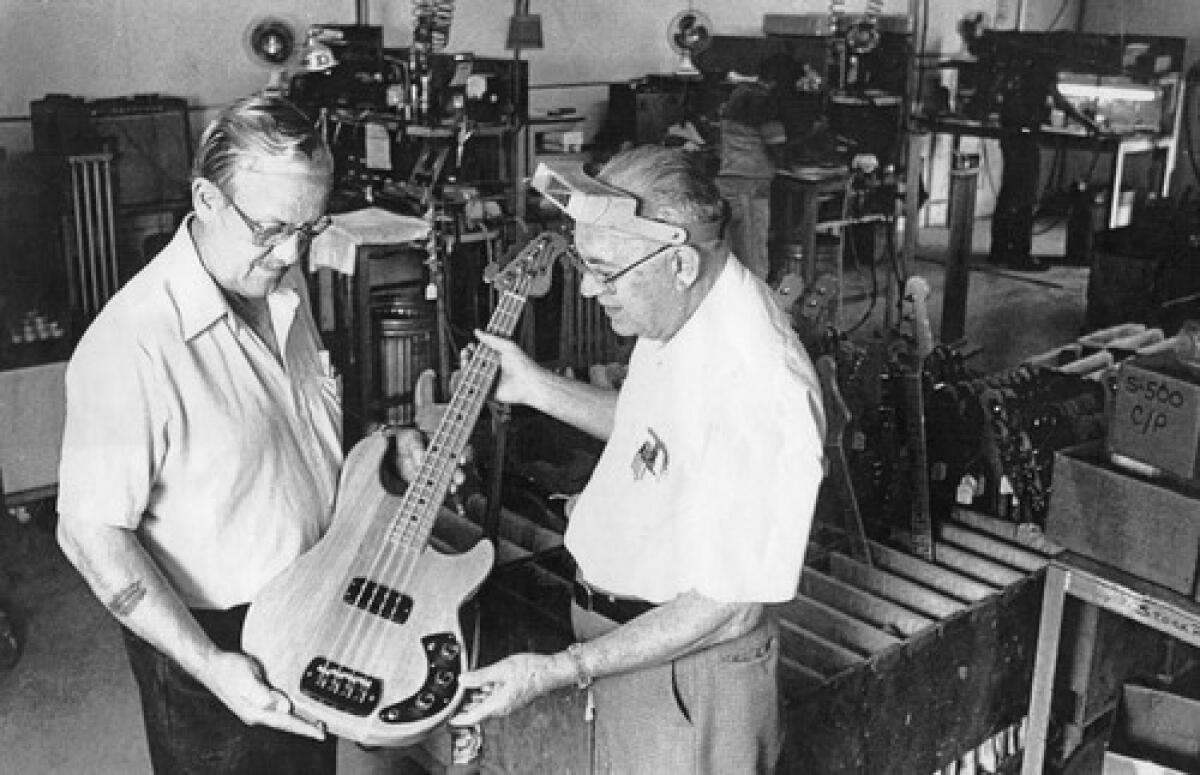George Fullerton dies at 86; musician helped Leo Fender create his unique guitars

- Share via
George Fullerton, a longtime associate of Leo Fender who played a crucial role in the electric-guitar innovator’s extraordinary success through his broad-based skills as a musician, artist and technician, has died. He was 86.
Fullerton died Saturday of congestive heart failure at St. Jude Medical Center in Fullerton, said his son Geoff.
While Fender tinkered away, coming up with improvements in guitar design that led to the creation of his revolutionary Telecaster and Stratocaster electric guitars, Fullerton was charged with making those innovations practical for mass production in their Orange County factory that opened in the late 1940s. Nearly 1,000 people were working there when Fender sold it to CBS in 1965.
FOR THE RECORD:
George Fullerton obituary: In the obituary in Wednesday’s Section A of longtime Leo Fender associate George Fullerton, Leo Fender Gallery curator Richard Smith was quoted as saying that Fullerton made “the machine that threaded the guitar necks.” What he actually said was “the machine that fretted the guitar necks.” —
“Leo’s domain was the lab: innovation, getting ideas together on the conceptual level. George’s domain was the shop,” said Richard Smith, curator of the Leo Fender Gallery at the Fullerton Museum Center and author of “Fender: The Sound Heard Round the World.” Fullerton “made the machine that threaded the guitar necks. He came up with the neck shaper and all these unique tools they used. If Leo had problems, [Fullerton] needed to solve them.”
Fullerton’s lifelong interest in art allowed him to create sketches of new designs based on his conversations with Fender, whose background was in accounting and electrical engineering.
George William Fullerton was born March 7, 1923, in Hindsville, Ark. He was one of six children in a family in which “everyone was musical,” Geoff Fullerton said. “There was definitely a music gene going on there.”
Fullerton moved to Southern California shortly before World War II. He picked up technical skills working in an aircraft manufacturing plant during the war, after which he periodically ran into Fender, who ran a radio repair service and retail store.
Fender had begun making guitars -- originally focusing on steel guitars -- and amplifiers with Doc Kaufman (under the K&F brand), but their partnership ended quickly because of differing ideas about how to run the business.
Going it alone, Fender offered Fullerton a job helping with radio repair, but he soon shifted over to provide warranty service on Fender’s steel guitars and amplifiers. Fender was as impressed by Fullerton’s musical credentials -- he was playing in two bands at night after work -- as by his technical know-how. Fender was confident in his own technical expertise but often hired employees who also were musicians because he could barely play a note, much less a song.
In the late 1940s, various guitar makers were experimenting with ways to amplify the sound of a guitar to allow it to be heard in larger dance halls and ballrooms that featured live music. Fender wasn’t the first to come up with a solid-body electric, which could handle a much greater degree of amplification without the sound feeding back, but his innovations in design allowed the instruments to be mass produced affordably -- something no one else had then figured out how to do.
They started working out of Fender’s small shop in Fullerton, then expanded to two buildings. The early Fender team also included Don Randall, originally a salesman who became Fender’s chief sales and marketing executive. At its height before the sale to CBS, Fender was turning out a guitar a minute from its 27 buildings in Fullerton and Anaheim.
Fender said he never regretted the sale, but he did have reservations about leaving many of his associates behind. Fullerton stayed on for about five years, but was disheartened by what he considered the new owners’ bottom-line mentality.
“Quality issues were always at the forefront of his mind,” Geoff Fullerton said. “The people at CBS would tell him ‘We can save a nickel by doing this,’ and his response would be ‘Yes, but you’ll screw the guy who’s playing it.’ So immediately there was a conflict there.”
He teamed again with Fender at the Music Man amplifier company, creating a new line of guitars, then they created G&L Guitars around 1980.
In recent years, Fullerton had served as a consultant to the Fender Custom Shop in Corona, the company’s high-end division that crafts upscale custom guitars for superstar clients as well as meticulous recreations of celebrity guitarists’ favorite instruments. “George was very passionate about music, as a lot of the people who worked at Fender were,” Smith said. “They thought they were doing something great for musicians, and they were. That whole spirit originated with Leo, that spirit of building better instruments to help musicians.”
Besides his son, Fullerton is survived by a daughter, Diane, and two grandchildren. A memorial has been scheduled for 10 a.m. July 25 at the Crystal Cathedral in Garden Grove. Instead of flowers, the family has asked that donations be sent to the St. Jude Memorial Foundation.
More to Read
Start your day right
Sign up for Essential California for the L.A. Times biggest news, features and recommendations in your inbox six days a week.
You may occasionally receive promotional content from the Los Angeles Times.




